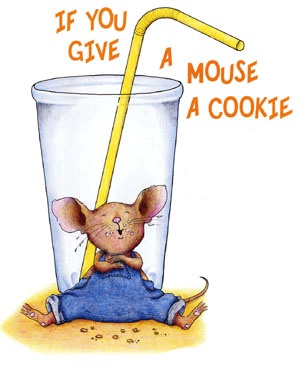If you give the government $1
If you give a government official $1, he'll want to start a new program. After starting a new program, he'll have to find a new problem. After finding a new problem, he'll want a bigger building. Before constructing that bigger building, he'll want a bond to pay for it. After bonding and construction, he'll want to hire people to fill the building. After hiring people to fill the building, he'll ask you for another dollar to pay the staff.
And if you give that new government official a dollar, he'll want to go out and start a new program.
Sound familiar?

The ideas coming from Nevada's big-spending crowd get increasingly dangerous as our budget shortfall becomes larger and state agencies begin their campaigns to demonstrate that their government service is the most important and thus simply can't be cut. Not surprisingly, Nevada System of Higher Education Chancellor Jim Rogers wants more taxes, more local support, and more resources devoted to education.
At least Rogers, unlike Senator Steven Horsford and Assembly Speaker Barbara Buckley, is willing to put his excruciatingly bad ideas on the table.
Rogers proposes: securitizing the tobacco fund to allegedly raise $600 million; increasing tuition and fees by 25 percent to raise another $50 million; eliminating certain loopholes with the hope that doing so will increase revenue by $600 million; bonding up to $700 million; diverting local tax sources to help fund education; taxing the mining industry and expanding the business tax; and begging the federal government for $3 billion.
Not surprisingly, this combination would do more than shore up the shortfall; it would actually allow for increases in government spending. Basically, the plan to solve our budgetary problem is to raise taxes in order to allow for new spending, which would have the effects of increasing the cost of living, putting people out of work and discouraging businesses from expanding in Nevada.
Government bureaucrats and administrators have no incentive to control costs. Since budgets are derived from forcing people to pay taxes, and not from individuals voluntarily paying for their services, there is little incentive to actually address the needs of the people or to watch out for the bottom line. If revenue levels fall, government doesn't have to figure out how to attract new customers or cut costs. It just has to summon the "courage" to raise your taxes.
Nevada not only needs to rein in uncontrollable government spending through spending limits, but also to create a system of accountability that provides strong incentives for state agencies to control costs.
Here's an idea: Perhaps future budgetary shortfalls should be covered by the paychecks of senior government officials and department heads before raising taxes is even an option.





